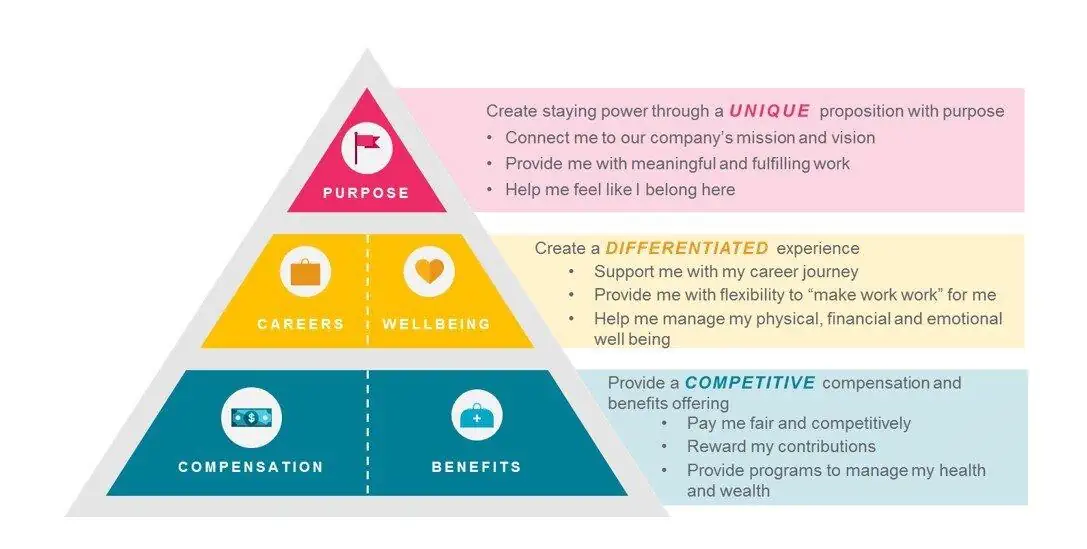We may find ourselves in a situation where the existing organizational compensation
system no longer fulfills its purpose, fails to support the recruitment of new
employees, or retain existing ones. An ineffective compensation system often leads
to high staff turnover, lengthy hiring processes, delays in filling vacancies, and falling
short of company goals.
To understand what constitutes an attractive compensation system this year,
compensation expert and founder of Cohorts, Evert Kraav, shared recommendations
based on his extensive experience at Recruri’s March morning seminar at Mektory.
The compensation system begins with the employer’s value proposition, and the
presenter highlighted Mercer’s model (see figure), which consists of three
components, with the base being fair wages, benefits, and perks. While wages are
always important to some extent within a company, the following levels help
differentiate the employer from competitors: employee experience, support for life
and career, and purpose, meaning meaningful work and pride in one’s employer.

An individual applying to your company will certainly want answers to the following
questions, based on the model (see figure):
- What is the basis for determining wages in your organization?
-How do we make sure that wages are fair and match what the employee brings to
the table? - Do the benefits offered by the company meet the candidate’s needs and are they
important to them? - What could be the candidate’s potential career path within the company, and does it
also involve changes in wages? - What flexibility can you offer as an employer to support a balance between the
employee’s work and personal life? - How does the company support the well-being of the candidate’s family, and what
are the resulting benefits? - What is the specific position’s impact on the company and the team, and how can
the candidate be a valuable part of it?
On April 24, 2023, the Council of the European Union adopted the Pay Transparency
Directive, aimed at ensuring equal pay for equal work between men and women.
Under the new requirements, companies should ensure the objectivity and gender
neutrality of pay setting, and companies with 100 or more employees will have
reporting obligations.
It is important in implementing the directive that transparency and fairness in
employees’ wage formation are ensured, and that organizations act in accordance
with the new regulations.
Public wages in both Latvia and Lithuania have helped reduce the wage gap and
hopefully will bring about a change in Estonia as well. It is gratifying to note that in
the first quarter of 2024, 43% of job advertisements entered to the Recrur software, included
public wages.
Evert Kraav emphasized that companies should have clearly defined roles and
career paths linked to wages. He did not consider linking tenure and wages to be
good practice. It is important to conduct a thorough evaluation of job levels and
relate them to market information. In addition, the expert highlighted important
sources to consider when designing wage systems:
- Various local and international salary surveys (e.g., Mercer, AIA)
- Salary change trends – percentage change and time dimension
- Company recruitment data – candidate expectations, acceptance rates of offers,
recruitment time, employee turnover, and its impact - Salaries and job content for similar positions at other companies
- Alternative options for existing employees – other jobs, locations, working
conditions
Kraav sees an increase in wage transparency in the future both in Estonia and
across Europe, leading to the creation of fairer compensation systems and an
increase in performance-based pay. In addition, he notices a growing interest among
companies in personalized offers that take into account the specific needs and
preferences of individuals.
Based on Kraav’s experience, some companies have begun to abandon traditional
benefits due to low interest, such as summer days off, and also consider that certain
benefits may lose their value in an older collective. It is always important to ask
employees what is important to them. In addition, greater involvement of freelancers
in companies and wider availability of wage data are predicted.
Undoubtedly, it is also worth remembering that nowadays, artificial intelligence helps
human resources departments create compensation systems and helps candidates
find suitable wages for specific positions, and AI assists candidates in participating
more successfully in salary negotiations.





